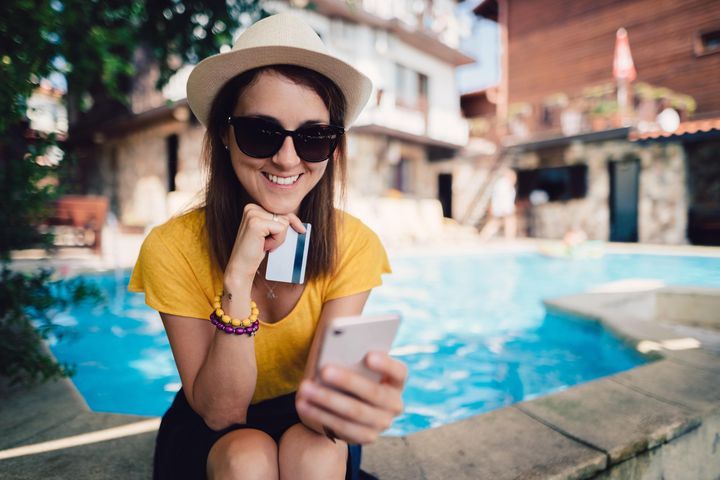Right? Sort of. Naturally, if you’ve saved for months for a blissful work-free break, you’ll feel entitled to live a little and splurge on something you’ve spent the previous nine months denying yourself. But having that holiday mentality can lead to excess spending, which is great at the time but returning home with less in your account than you imagined will put you in an unhappy post- vacation mood.
According to research from HSBC UK which surveyed more than 2,000 people in June, the average holidaymaker spends £250 more on “extras” during a one-week getaway than when they are at home. Unsurprisingly, dining out, live events, clothes and transport are among the items people are more inclined to splash out on. Additionally, the research indicated that people do not like talking about spending splurges with more than half (57%) of people said they never disclose how much they have spent on holiday.

And consumers are choosing to spend more on holidays and entertainment — according to TSB analysis of customers’ shopping habits, spending on both increased in the first half of 2024 compared with the same period in 2023. TSB analysed more than 425 million debit card transactions between January 1 and June 30 and compared them with the same period in 2023. The bank recorded a 9.
2% increase in the total value of spending with airline and travel companies. “Our holiday mentality which encourages us to spend much more than we would at home is down to three main factors,” says behavioural psychologist Jo Hemmings. “Simply being out of our usual daily routine contributes to a sense of relaxation and reward, stimulating our feel-good hormones of serotonin and dopamine and reducing our stress hormone, cortisol, making us more likely to spend money on clothes, dining out and new experiences.
“Holidays are also associated with special occasions and escapism — whether that’s a birthday or an anniversary, the arrival of warm weather or simply the holiday itself which we have anticipated and saved for, enables us to justify spending more money than usual. “We are also less inhibited on holiday, so we feel less constrained by our usual financial mindsets and the sense of spending more on immediate pleasures rather than deferred rewards — known as temporal discounting — is also heightened.” Before you head for the airport, we’ve six ways that’ll help minimise your potential overspending.
It is the single most important way to ensure you don’t overspend. Whether it’s taking out a set amount each day — knowing you have access to additional funds just in case — to cover planned expenses will help you avoid going overboard. Yes, debit and credit cards are convenient, particularly when you’re travelling, but all the tap dancing does is (often) make you forget how much you’ve spent.
No one wants a sad face when they return home to check their balance and realise they’d forgotten about buying the second and third round of umbrella-laden cocktails. OK, it doesn’t necessarily make for a spontaneous holiday but having an itinerary helps falling into overspending. And it doesn’t need to be minute by minute, even a loose idea will give you a better idea of how much you’ll need while it not being the focus of the trip.
Of course, there are often ample low or no-cost activities, depending on where you are. if you slot some of these in, you may have more dosh to spend on things with a higher cost. You’ve got a finite number of days to see as much as possible, lie in the sun as much as possible and check off the ‘must-sees’ as much as possible.
But before you even try to work out your daily budget — see below — decide on your trip expectations. If you want to do something pricey — a riverboat cruise, dinner in a multi award-winning restaurant — speak to your travelling companions before you jet off. If you all want to do it and don’t want to go over the financial limit, agree on what you’re willing to compromise.
For example, if you’re staying in self-catering accommodation, could you opt for dinner in your location for a few nights and not head out? Budgeting isn’t about saying no, it’s about saying yes to the most appropriate things. Exchange rates change daily and, depending on the difference, you may spend more than you’ve intended. Generally, exchanging money at a bank is more cost-effective than at the airport.
And when it comes to paying with debit or with credit cards, when asked, opt for purchasing in the currency of the country you’re visiting rather than your normal currency. Your bank will give you the best rate compared to from whom you’re purchasing. Social influences can contribute to overspending if travellers feel pressurised to participate in activities for fear of missing out.
Even if you’re secure in your spending, it can be difficult in the moment to say no to an event, meal, tour when your travelling companions are beside you and the aforementioned event etc, begins in 10 minutes. Before travelling, make sure to have that conversation with family or friends about the realities of the holiday. Ensure this conversation is reiterated during the trip if things get heated.
If everyone knows what each is comfortable spending, it can prevent awkwardness or even resentment, allowing you to simply sit back and bask in the very thing you’ve worked so hard to enjoy. Social media can also make some feel as though they’re missing out by not saying yes to everything while on a break. Where possible, avoid taking inspiration from other accounts; there’s no need to keep up with people whom you’ve probably never met.
Listen, we know, easier said than done. Things can happen whereby you need to spend a bit more but, where possible, plan as much as you can. Think about the extras on the flight — yes, even cups of tea and packets of shortbread add up — plus the extras in the airport en route to the departure gate.
Just because you’re almost jetting off doesn’t mean all the mini toiletries need to be bought in the airport shop. Or that 500-page novel that you won’t read but will add extra weight to your luggage. Or your sixteenth travel pillow.
While on holiday, plan your daily budget for snacks, drinks, transportation and activities. Don’t forget to include souvenirs and gifts, plus the understandable purchases from the local supermarket (who doesn’t want to bring oddly flavoured crisps and liqueur home?). There are easy ways to reduce daily costs — from taking a reusable water bottle to fill up (bottled water can be costly at popular tourist attractions) to deciphering whether a tourist card which affords discounts for must-see locations is worth purchasing.
If you know where you can save, it’ll open up the areas where you’d like to spend. After all, it’s still a holiday, not an endurance test..


















